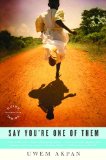Summary | Excerpt | Reviews | Beyond the book | Read-Alikes | Genres & Themes | Author Bio

A Memoir
by Wole SoyinkaFrom the book jacket: The first African to receive the Nobel Prize in
Literature, as well as a political activist of prodigious energies, Wole Soyinka
now follows his modern classic Ake: The Years of Childhood with an
equally important chronicle of his turbulent life as an adult in (and in exile
from) his beloved, beleaguered homeland.
In the tough, humane, and lyrical language that has typified his plays and
novels, Soyinka captures the indomitable spirit of Nigeria itself by bringing to
life the friends and family who bolstered and inspired him, and by describing
the pioneering theater works that defied censure and tradition. Soyinka not only
recounts his exile and the terrible reign of General Sani Abacha, but shares
vivid memories and playful anecdotes–including his improbable friendship with a
prominent Nigerian businessman and the time he smuggled a frozen wildcat into
America so that his students could experience a proper Nigerian barbecue.
Comment: While studying in England in 1956, Nigerian-born Soyinka was
tempted to travel to Hungary to join in the uprising against the Soviet Union,
but his father advised that instead he, "Kindly return home and make this your
battlefield". Soyinka listened to his father's request and returned home to Nigeria in 1960 with a grant to
pursue research in traditional West African theater; from there he went on to
become one of Africa's most famous writers (especially so after he became the
first African to win the Nobel Prize for Literature) and a vocal political
activist. You Must Set Forth At Dawn focuses on Soyinka's adult
life as a playwright and author who has turned his mind and pen to political
activism, speaking out against multiple Nigerian dictatorships (there have been nine
military dictatorships since 1962, separated by brief periods of civilian rule).
The book opens in 1998 when, following the death of
Sani Abacha (de facto President of Nigeria from 1993 - 1998), Soyinka
returns to Nigeria after five years in exile. From this opening point his
memoir jumps back and forth in time, so readers who are not intimately familiar
with the history of post-colonial Nigeria will probably want to keep a bookmark
in the chronology of key dates that is helpfully provided.
Soyinka, who
describes himself as a "closet glutton for tranquility", has lived a life that is
intricately linked with the history of Nigeria and therefore has been anything
but tranquil. As such You Must Set Forth At Dawn is first and foremost a
political memoir that also serves as a political history of contemporary
Nigeria. Very little space is given over to describing
his personal life, but we know of his childhood from his 1981 memoir, Aké: Memoirs of a Nigerian Childhood,
and from other sources we know that he has had three wives and produced "many"
children. There is also little detail about the two years he spent in
solitary confinement, which was chronicled in The Man Died (1972).
So many professional reviewers have pitched in with views about this book
that there is really very little new that we can add to what has already been
said:
"With the passionate close-up view of the past and the
valuable insights, many of them highly critical, about today's leaders, this is
a must for anyone concerned with human rights and the global web of oil,
poverty, and corruption." - Booklist.
"A brilliant imagist who uses poetry and drama to convey his inquisitiveness,
frustration, and sense of wonder." - Newsweek.
"By turns panoramic and intimate, ruminative and politically resolute, Soyinka's
memoir is a dense but intriguing conversation between a writer and his times." -
Publishers Weekly.
"Humane, sensible and impeccably written; a fitting summation of a life
interestingly lived, and one hopes with more reflections to come." - Kirkus.
![]() This review
first ran in the April 5, 2007
issue of BookBrowse Recommends.
This review
first ran in the April 5, 2007
issue of BookBrowse Recommends.

If you liked You Must Set Forth at Dawn, try these:

by Chimamanda Ngozi Adichie
Published 2010
Searing and profound, suffused with beauty, sorrow, and longing, the stories in The Thing Around Your Neck map, with Adichie's signature emotional wisdom, the collision of two cultures and the deeply human struggle to reconcile them.

by Uwem Akpan
Published 2009
Uwem Akpan's stunning stories humanize the perils of poverty and violence so piercingly that few readers will feel they've ever encountered Africa so immediately.
Your guide toexceptional books
BookBrowse seeks out and recommends the best in contemporary fiction and nonfiction—books that not only engage and entertain but also deepen our understanding of ourselves and the world around us.